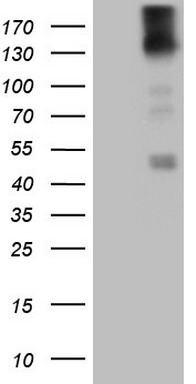PDGF Receptor alpha (PDGFRA) Mouse Monoclonal Antibody [Clone ID: OTI1C10]
CAT#: CF807645
Carrier-free (BSA/glycerol-free) PDGFRA mouse monoclonal antibody, clone OTI1C10 (formerly 1C10)
Formulation: Standard
Frequently bought together (2)
Other products for "PDGF Receptor alpha"
Specifications
| Product Data | |
| Clone Name | OTI1C10 |
| Applications | IHC, WB |
| Recommended Dilution | WB 1:2000, IHC 1:150 |
| Reactivities | Human, Mouse, Rat |
| Host | Mouse |
| Isotype | IgG1 |
| Clonality | Monoclonal |
| Immunogen | Human recombinant protein fragment corresponding to amino acids 789-1089 of human PDGFRA(NP_006197) produced in E.coli. |
| Formulation | Lyophilized powder (original buffer 1X PBS, pH 7.3, 8% trehalose) |
| Reconstitution Method | For reconstitution, we recommend adding 100uL distilled water to a final antibody concentration of about 1 mg/mL. To use this carrier-free antibody for conjugation experiment, we strongly recommend performing another round of desalting process. (OriGene recommends Zeba Spin Desalting Columns, 7KMWCO from Thermo Scientific) |
| Purification | Purified from mouse ascites fluids or tissue culture supernatant by affinity chromatography (protein A/G) |
| Conjugation | Unconjugated |
| Storage | Store at -20°C as received. |
| Stability | Stable for 12 months from date of receipt. |
| Predicted Protein Size | 120.3 kDa |
| Gene Name | platelet derived growth factor receptor alpha |
| Database Link | |
| Background | This gene encodes a cell surface tyrosine kinase receptor for members of the platelet-derived growth factor family. These growth factors are mitogens for cells of mesenchymal origin. The identity of the growth factor bound to a receptor monomer determines whether the functional receptor is a homodimer or a heterodimer, composed of both platelet-derived growth factor receptor alpha and beta polypeptides. Studies suggest that this gene plays a role in organ development, wound healing, and tumor progression. Mutations in this gene have been associated with idiopathic hypereosinophilic syndrome, somatic and familial gastrointestinal stromal tumors, and a variety of other cancers. [provided by RefSeq, Mar 2012] |
| Synonyms | CD140A; PDGFR-2; PDGFR2; RHEPDGFRA |
| Reference Data | |
| Protein Families | Druggable Genome, ES Cell Differentiation/IPS, Protein Kinase, Transmembrane |
| Protein Pathways | Calcium signaling pathway, Colorectal cancer, Cytokine-cytokine receptor interaction, Endocytosis, Focal adhesion, Gap junction, Glioma, MAPK signaling pathway, Melanoma, Pathways in cancer, Prostate cancer, Regulation of actin cytoskeleton |
Documents
| Product Manuals |
| FAQs |
| SDS |
Resources
| Antibody Resources |
{0} Product Review(s)
0 Product Review(s)
Submit review
Be the first one to submit a review
Product Citations
*Delivery time may vary from web posted schedule. Occasional delays may occur due to unforeseen
complexities in the preparation of your product. International customers may expect an additional 1-2 weeks
in shipping.






























































































































































































































































 Germany
Germany
 Japan
Japan
 United Kingdom
United Kingdom
 China
China








